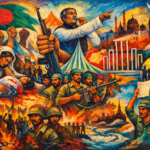In the humid heart of Dhaka, something sinister is taking root. The recent “March for Gaza” rally, drawing an estimated 100,000 protesters, was less a demonstration of solidarity for war-stricken Palestinians and more a chilling spectacle of ideological rot and Islamist grandstanding. Under the shadow of Palestinian flags, slogans, and effigies burned to ash, Bangladesh revealed the darkest underbelly of its current trajectory—one that mimics the worst instincts of theocratic Pakistan and stinks of theocratic nostalgia wrapped in radical piety.
What started as cries for Gaza quickly descended into open declarations of hate. Banners eulogizing Hitler were waved alongside chants praising Hamas. Images of global leaders—Netanyahu, Trump, Modi—were trampled, slapped with sandals, and burned. Effigies were carried in mock funerals as if Dhaka had declared a symbolic global jihad from its historic Suhrawardy Udyan. This was no grassroots outcry against war crimes. This was political Islam in full display, weaponizing a distant conflict to inject poison into Bangladesh’s bloodstream.
Let’s not be naïve. Humanitarians didn’t orchestrate this rally. It was led by Islamist networks—particularly Al Markazul Islami—whose founder had ties to Al-Qaeda and who once dabbled in bombs rather than ballots. It was these groups that draped themselves in the cloak of Palestinian solidarity to push an agenda of hate, division, and militant resurrection. When a banner openly yearns for “an Islamic soldier like Hitler,” the mask is off. This is not resistance. It is ideological terrorism, rehearsed and unleashed.
And it’s not just a moment. It’s a movement—a slow, calculated drift towards the abyss. Jamaat-e-Islami, once banned and discredited, is back. BNP, hungry for relevance, is openly colluding with Islamist outfits under the guise of pan-Muslim unity. An interim government under Muhammad Yunus, projected as neutral, has proven to be spineless or worse—sympathetic. The walls built by the secular forces post-1971 are now cracking, one concession at a time. The lifting of bans, the silent acceptance of sectarian hate, and the public glorification of terrorist proxies like Hamas point to a state losing its grip on its founding principles.
Where is the outrage for Bangladesh’s own? Where were the protests when Hindus were dragged out and beaten? When were temples desecrated? When religious minorities were hunted by mobs intoxicated with hate? Instead, the country sheds crocodile tears for a foreign cause while ignoring the blood that stains its soil. Bangladesh has become a stage where Islamist sympathizers act out fantasies of global jihad, while its own secular and diverse heritage is dragged through the mud.
Once proud of its non-alignment and cultural pluralism, the state is drifting into a geopolitical dead zone. Reinstating the “Except Israel” clause on passports is more than a diplomatic slap—it’s a declaration that Bangladesh has chosen ideology over international engagement. It’s aligning itself with the most radical voices in the Islamic world—while even Arab nations are moving toward pragmatism and regional peace. In contrast, Bangladesh seems desperate to join the graveyard of failed Islamist republics—isolated, angry, and blindly radical.
Make no mistake—this is Pakistan 2.0 in the making. A nation that once prided itself on choosing culture, language, and secularism over fanatical dogma is now aping the very ideology it bled to break away from in 1971. The flags may be Bangladeshi, but the ideology is unmistakably Pakistani. The venom, the street mobs, the glorification of martyrdom, the refusal to engage with dissent—all bear the mark of a nation becoming a willing hostage to the most regressive elements of the Islamic world.
And let’s not even pretend this ends with Israel. Once the Islamist machinery is fully oiled and empowered, it will turn inward. The same street power that curses the West and waves the Hamas flag will next target journalists, artists, feminists, teachers, minorities, and anyone who dares to think freely. This is the Islamist blueprint—tested, replicated, and fatal. Bangladesh is dancing dangerously close to the edge.
This is not just about foreign policy or protests. This is about identity. About whether Bangladesh remains the country that dreamed of Tagore and Nazrul, of syncretism and secularism—or whether it becomes a monochrome, hate-filled outpost of global Islamism, where every dissenting voice is silenced, and every street protest is a rehearsal for the next ideological purge.
The time for euphemism is over. Bangladesh is at a tipping point. Either it claws back from this ideological suicide, or it embraces a path that leads to isolation, extremism, and the eventual collapse of its social fabric. The streets have spoken. The mollahs are marching. The flags have changed. And unless the people—and the state—wake up from this fever dream of ideological purity, the Bangladesh we once knew will vanish, replaced by a hinterland of radicalism, howling into the void of self-imposed exile.
References:
-
The Times of Israel, April 12, 2025 – “Around 100,000 protest Gaza war in Bangladesh, beat images of Netanyahu, allies”
-
Al Jazeera, April 13, 2025 – “At least 100,000 protesters rally for Gaza in Bangladesh’s capital”
-
YouTube Coverage (Channels: RTV, Ekattor TV, Al Jazeera English) – “Bangladesh rally for Gaza,” April 2025
-
JFeed (Jewish World), April 2025 – Coverage on antisemitic placards at Dhaka protest
-
Sergio Restelli, The Times of Israel Blogs – “Why Bangladesh is becoming a new Islamist battleground”
-
India Today, The Diplomat, Republic World – Various commentaries on Islamist resurgence in Bangladesh
-
AP News & Reuters – Reporting on recent reinstatement of passport ban on Israel and rise in minority attacks






